Liberty, June 5, 1926
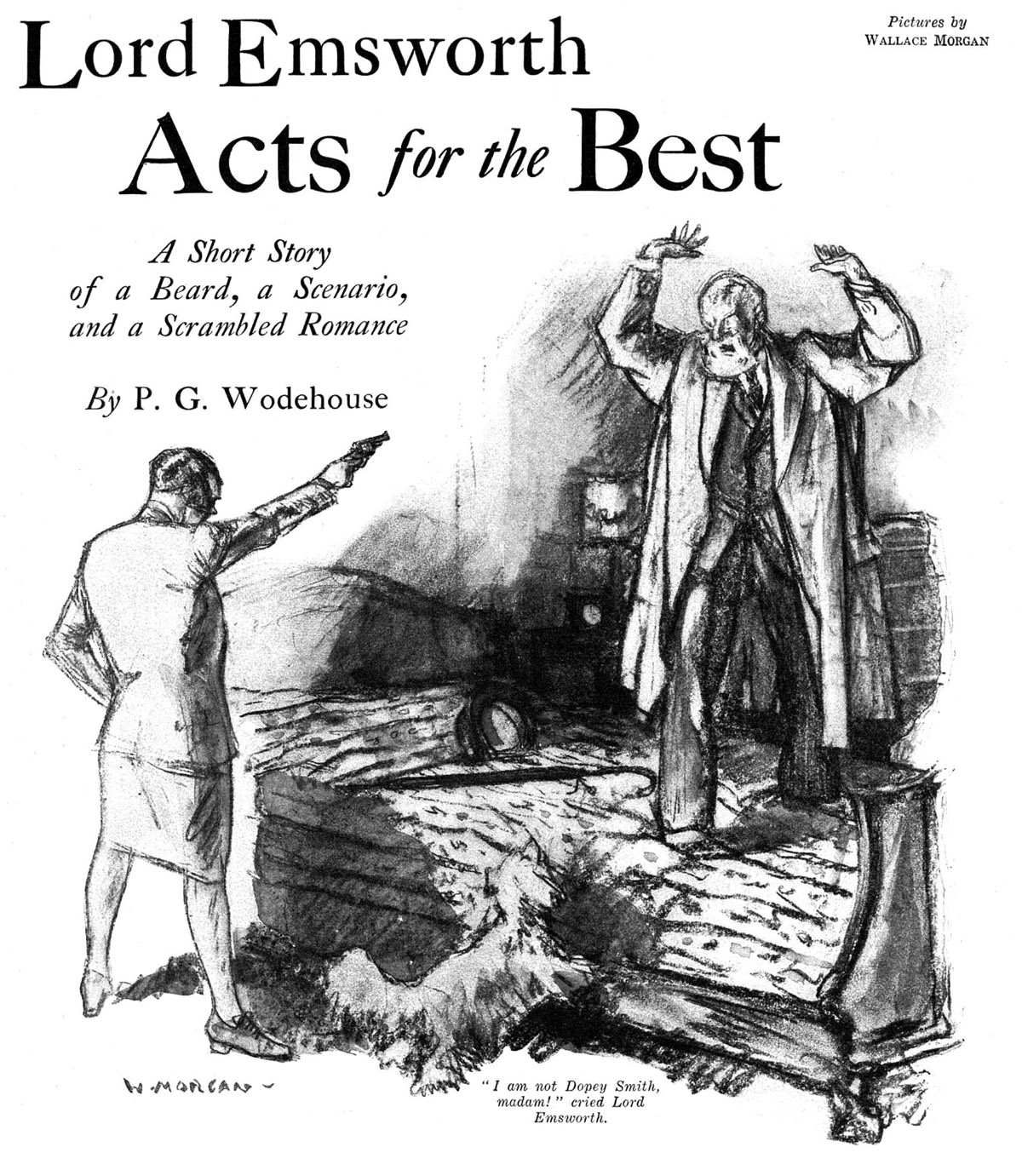
THE housekeeper’s room at Blandings Castle, G. H. Q. of the domestic staff that ministered to the needs of that amiable but woolen-headed peer, the Earl of Emsworth, was in normal circumstances a pleasant and cheerful apartment.
Yet, with the entry of Beach, the butler, it was as though there had crept into its atmosphere a chill dreariness, and Mrs. Twemlow, the housekeeper, laying down her knitting, gazed at him in alarm.
“Whatever is the matter, Mr. Beach?”
The butler stared moodily out of the window. His face was drawn and he breathed heavily, as a man will who is suffering from a combination of strong emotion and adenoids. A ray of sunshine, which had been advancing jauntily along the carpet, caught sight of his face and slunk out, abashed.
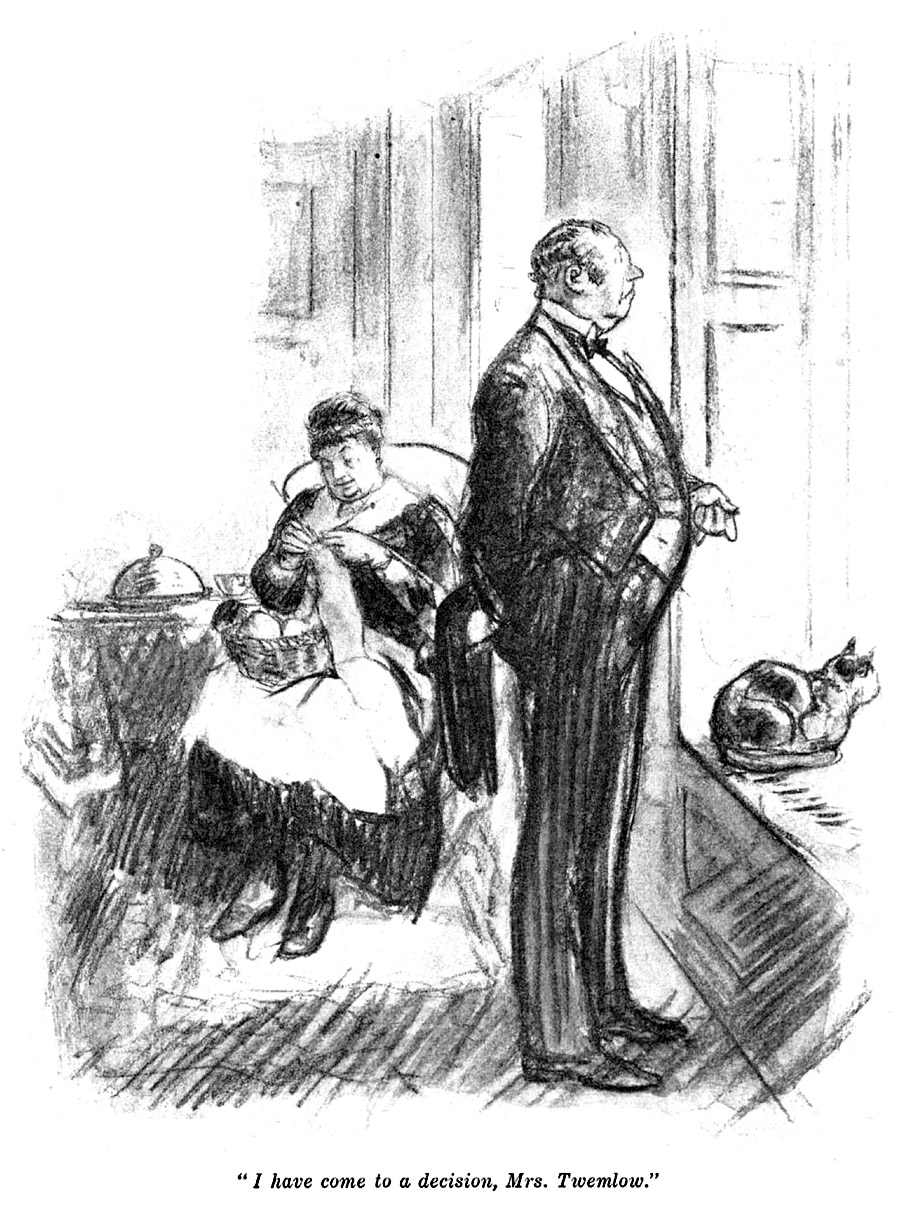
“I have come to a decision, Mrs. Twemlow.”
“What about?”
“Ever since his lordship started to grow it, I have seen the writing on the wall plainer and plainer, and now I have made up my mind. The moment his lordship returns from London, I tender my resignation. Eighteen years have I served in his lordship’s household, commencing as underfootman and rising to my present position, but now the end has come.”
“You don’t mean you’re going just because his lordship has grown a beard?”
“It is the only way, Mrs. Twemlow. That beard is weakening his lordship’s position throughout the entire countryside. Are you aware that at the recent Sunday-school treat I heard cries of ‘Beaver!’?”
“No!”
“Yes! And this spirit of mockery and disrespect will spread. And, what is more, that beard is alienating the best elements in the county. I saw Sir Gregory Parsloe-Parsloe look very sharp at it when he dined with us last Friday.”
“It is not a handsome beard,” admitted the housekeeper.
“It is not. It looks like some sort of fungus. And his lordship must be informed. As long as I remain in his lordship’s service, it is impossible for me to speak. So I shall tender my resignation. Once that is done, my lips will no longer be sealed. Is that buttered toast under that dish, Mrs. Twemlow?”
“Yes, Mr. Beach. Take a slice. It will cheer you up.”
“Cheer me up!” said the butler, with a hollow laugh that sounded like a knell.
IT was fortunate that Lord Emsworth, seated at the time of this conversation in the smoking-room of the Senior Conservative Club in London, had no suspicion of the supreme calamity that was about to fall upon him, for there was already much upon his mind.
In the last few days, indeed, everything seemed to have gone wrong. Angus McAllister, his head gardener, had reported an alarming invasion of green fly among the roses. A favorite and respected cow had contracted a mysterious ailment which was baffling the skill of the local vet. And on top of all this a telegram had arrived from his lordship’s younger son, the Hon. Frederick Threepwood, announcing that he was back in England and desirous of seeing his father immediately.
This, felt Lord Emsworth, as he stared bleakly before him at the little groups of happy Senior Conservatives, was the most unkindest cut of all. What on earth was Freddie doing in England? Eighteen months before, he had married the only daughter of Donaldson’s Dog Biscuits, of Long Island City in the United States of America; and in Long Island City he ought now to have been, sedulously promoting the dog-biscuit industry’s best interests. Instead of which, here he was in London—and, according to his telegram, in trouble.
Lord Emsworth passed a hand over his chin, to assist thought, and was vaguely annoyed by some obstacle that intruded itself in the path of his fingers. Concentrating his faculties, such as they were, on this obstacle, he discovered it to be his beard. It irritated him. Hitherto, in moments of stress, he had always derived comfort from the feel of his clean-shaven chin.
He perceived his child approaching him across the smoking-room floor.
“Hullo, guv’nor!” said Freddie.
“Well, Frederick?” said Lord Emsworth.
There followed a silence. Lord Emsworth, on his side, was brooding on that phrase “in trouble,” which had formed so significant a part of his son’s telegram.
“Do sit down,” he said testily.
“Right-ho,” said Freddie, taking a chair. “It was dashed good of you, guv’nor, to come bounding up to town so promptly.”
“I came because your telegram said that you were in trouble.”
“British,” said Freddie approvingly; “very British.”
“Though what trouble you can be in, I cannot imagine. It is surely not money again?”
“Oh, no. Not money. It’s Aggie. My wife, you know.”
“Well?”
“She’s left me.”
“Left you!”
“Absolutely flat. Buzzed off, and the note pinned to the pincushion. She’s now at the Savoy and won’t let me come near her; and I’m at a service flat in King Street, eating my jolly old heart out, if you know what I mean.”
Lord Emsworth uttered a deep sigh.
“The fault,” he said tonelessly, “was, I suppose, yours?”
“Well, it was like this, guv’nor. You know how keen I’ve always been on the movies. Well, one night, as I was lying awake, I suddenly got the idea for a scenario of my own. And dashed good it was, too.”
“What I am anxious to learn from you—in as few words as possible—is the reason for the breach between your wife and yourself.”
“Well, I’m telling you. It all started with the scenario. When I’d written it, I naturally wanted to sell it to somebody, and just about then Pauline Petite came East and took a house at Great Neck, and a pal of mine introduced me to her.”
“Who is Pauline Petite?”
“Good heavens, guv’nor!” Freddie stared, amazed. “You don’t mean to sit there and tell me you’ve never heard of Pauline Petite, the movie star?”
“What about this woman?”
“Well, a pal of mine introduced me to her, you see, and I started to pave the way to getting her interested in this scenario of mine. Because, if she liked it, of course it meant everything. Well, this involved seeing a good deal of her, you understand, and one night Jane Yorke happened to come on us having a bite together at a roadhouse.”
“Good God!”
“OH, it was all perfectly respectable, guv’nor. All strictly on the up-and-up. Purely a business relationship. But the trouble was I had kept the thing from Aggie, because I wanted to surprise her. And most unfortunately I had said that I had to go to Chicago that night on business. So, what with one thing and another! Well, as I said just now, she’s at the Savoy and I’m——”
“Who is Jane Yorke?”
A scowl marred Freddie’s smooth features.
“A pill, guv’nor. One of the worst. A Jebusite and an Amalekite. If it hadn’t been for her, I believe I could have fixed the thing. But she got hold of Aggie and whisked her away and poisoned her mind. This woman, guv’nor, has got a brother in the background, and she wanted Aggie to marry the brother. And my belief is that she is now trying to induce Aggie to pop over to Paris and get a divorce, so as to give the blighted brother another look-in, dash him! So now, guv’nor, is the time for action. Now is the moment to rally round as never before. I rely on you.”
“Me? What on earth do you expect me to do?”
“Why, go to her and plead with her. They do it in the movies. I’ve seen thousands of pictures where the white-haired old father——”
“Stuff and nonsense!” said Lord Emsworth, stung to the quick; for, like so many well preserved men of ripe years, he was under the impression that he was merely slightly brindled.
“You have made your bed and you must stew in it.”
“Eh?”
“I mean, you must stew in your own juice. I refuse to allow myself to be drawn into the matter.”
“You won’t even give her a ring on the telephone?”
“I will not.”
“Oh, come, guv’nor. Be a sport. Her suite’s Number Sixty-seven. You can get her in a second and state my case, all for the cost of twopence. Have a pop at it.”
“No.”
FREDDIE rose with set face. He looked like a sheep that has had bad news.
“Very well,” he said tensely. “Then I may as well tell you, guv’nor, that my life is as good as over. The future holds nothing for me. I am a spent egg. If Aggie goes to Paris and gets that divorce, I shall retire to some quiet spot and there pass the few remaining years of my existence, a blighted wreck. Good-by, guv’nor.”
“Good-by.”
“Honk-honk!” said Freddie moodily.
As a general rule, Lord Emsworth was an early and a sound sleeper, one of the few qualities which he shared with Napoleon Bonaparte being the ability to slumber the moment his head touched the pillow. But that night, weighted down with his troubles, he sought unconsciousness in vain. And somewhere in the small hours of the morning, he sat up in bed, quaking. A sudden grisly thought had occurred to him.
Freddie had stated that, in the event of his wife’s obtaining a divorce, he proposed to retire for the rest of his life to some quiet spot. Suppose by quiet spot he meant Blandings Castle! The possibility shook Lord Emsworth like an ague.
Freddie had visited Blandings for extended periods before, and it was his lordship’s considered opinion that the boy was a worse menace to the happy life of rural England than bots, green fly, or foot-and-mouth disease. The prospect of having him at Blandings indefinitely affected Lord Emsworth like a blow on the base of the skull.
Waking after a belated sleep and sipping his early tea, Lord Emsworth found himself full of a new resolve. He had changed his mind. It was his intention now to go to this daughter-in-law of his and plead with her as no father-in-law had ever pleaded yet.
A man who has had a disturbed night is not at his best on the following morning. Until after luncheon Lord Emsworth felt much too heavy-headed to do himself justice as a pleader. But a visit to the flowers at Kensington Gardens, followed by a capital chop and half a bottle of claret at the Regent Grill, put him into excellent shape. The heaviness had vanished, and he felt alert and quick-witted.
So much so that, on arriving at the Savoy Hotel, he behaved with a cunning of which he had never hitherto suspected himself capable. On the very verge of giving his name to the desk clerk, he paused. It might well be, he reflected, that this daughter-in-law of his, including the entire Emsworth family in her feud, would, did she hear that he was waiting below, nip the whole program in the bud by refusing to see him. Better, he decided, not to risk it. Moving away from the desk, he headed for the lift, and presently found himself outside the door of Suite Sixty-seven.
He tapped on the door. There was no answer. He tapped again and, once more receiving no reply, felt a little nonplused. He was not a very far-seeing man, and the possibility that his daughter-in-law might not be at home had not occurred to him.
He was about to go away when, peering at the door, he perceived that it was ajar. He pushed it open and, ambling in, found himself in a cozy sitting-room, crowded, as feminine sitting-rooms are apt to be, with flowers of every description.
Flowers were always a magnet to Lord Emsworth, and for some happy minutes he pottered from vase to vase, sniffing.
IT was after he had sniffed for perhaps the twentieth time that the impression came to him that the room contained a curious echo. It was almost as though, each time he sniffed, some other person sniffed too. And yet the place was apparently empty. To submit the acoustics to a final test, his lordship sniffed once more. But this time the sound that followed was of a more sinister character. It sounded to Lord Emsworth exactly like a snarl.
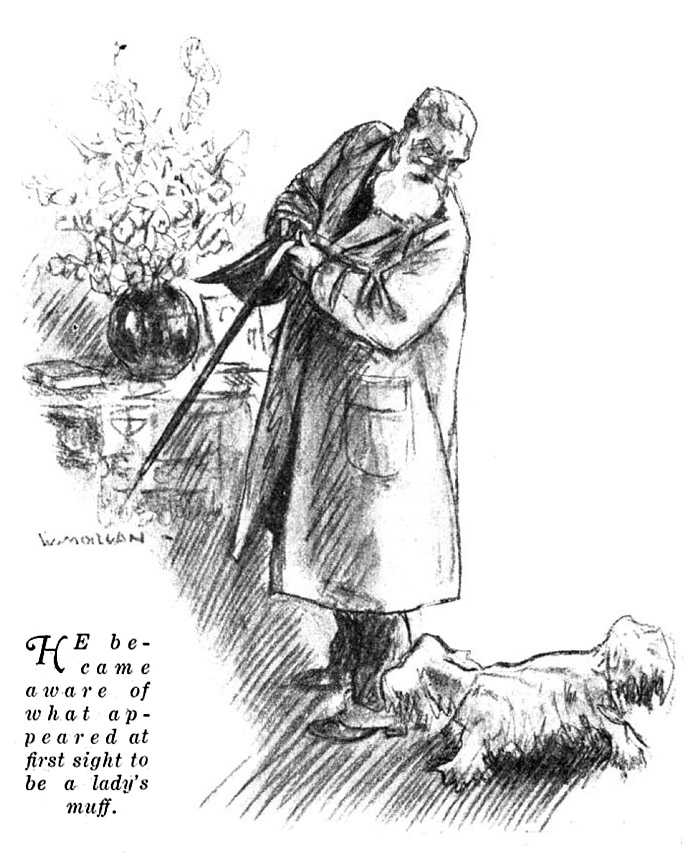 It was a snarl. Chancing to glance floorward, he became immediately aware, in close juxtaposition to his ankles, of what appeared at first sight to be a lady’s muff. But, this being one of his bright afternoons, he realized in the next instant that it was no muff but a toy dog of the kind that women are only too prone to leave lying about their sitting-rooms.
It was a snarl. Chancing to glance floorward, he became immediately aware, in close juxtaposition to his ankles, of what appeared at first sight to be a lady’s muff. But, this being one of his bright afternoons, he realized in the next instant that it was no muff but a toy dog of the kind that women are only too prone to leave lying about their sitting-rooms.
“God bless my soul!” exclaimed Lord Emsworth. He backed uneasily. The dog followed him. It appeared to have no legs but to move by faith alone.
“Go away, sir!” said Lord Emsworth.
He hated small dogs. They nipped you. He was now in a bedroom; and, judging by the look of things, likely to remain there for some time. The woolly dog had cast off all pretense of armed neutrality and was yapping with a hideous intensity and shrillness. And ever and anon it scratched with baffled fury at the lower panels.
“Go away, sir!” thundered his lordship.
“Who’s there?”
Lord Emsworth leaped like a jumping bean.
“Who is there?”
The mystery, which had begun to assume an aspect of the supernatural, was solved. On the other side of the room was a door, and it was from behind this that the voice had spoken. It occurred to Lord Emsworth that it was merely part of the general malignity of Fate that he should have selected for a formal father-in-lawful call the moment when his daughter-in-law was taking a bath.
He approached the door, and spoke soothingly.
“There is no cause for alarm——”
He broke off abruptly. There was very vital cause for alarm. The door of the bedroom had opened, and the muff-like dog, shrilling hate, was scuttling in its peculiar legless manner straight for his ankles.
Peril brings out unsuspected qualities in every man. From where he had been standing the bed was a considerable distance away, but he reached it with inches to spare, and stood there, quivering. Below him, the woolly dog raged like the ocean at the base of a cliff.
It was at this point that his lordship became aware of a young woman standing in the doorway through which he had just passed.
About this young woman there were many points which would have found little favor in the eyes of a critic of feminine charm. She was too short, too square, and too solid. She had a much too determined chin. And her hair was of an unpleasing gingery hue. But the thing Lord Emsworth liked least about her was the pistol she was pointing at his head.
It is not easy for a man who is standing on a bed with his hands up to achieve dignity, but Lord Emsworth did the best he could.
“My dear madam!”
“What are you doing here?”
“I found the door ajar——”
“——And walked in to see if there were any jewel-cases ajar, too. I think,” added the young woman, raising her voice so as to make herself audible to the unseen bather, “it’s Dopey Smith.”
“Who?”
“Dopey Smith. The fellow the cops said tried for your jewels in New York. He must have followed you over here.”
“I am not Dopey Smith, madam!” cried his lordship. “I am the Earl of Emsworth.”
“You are?”
“Yes, I am.”
“Yes you are!”
“I came here to see my daughter-in-law.”
“Well, here she is.”
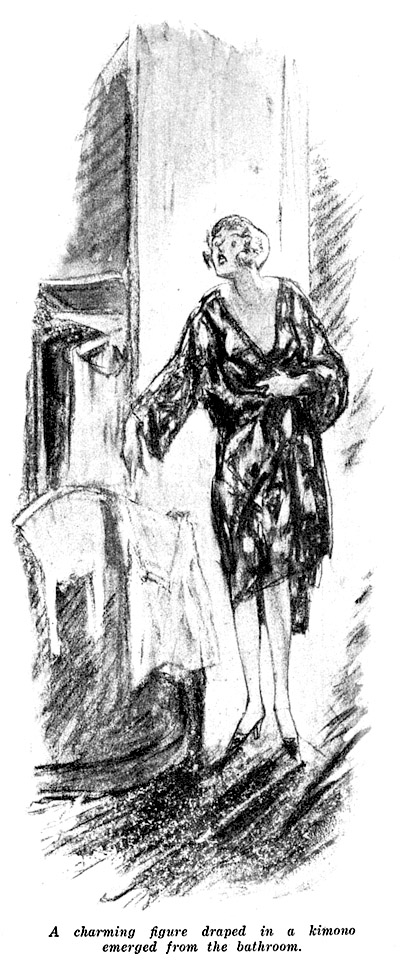 THE bathroom door opened, and there emerged a charming figure draped in a kimono. Even in that tense moment Lord Emsworth was conscious of a bewildered astonishment that such a girl could ever have stooped to mate with his son Frederick.
THE bathroom door opened, and there emerged a charming figure draped in a kimono. Even in that tense moment Lord Emsworth was conscious of a bewildered astonishment that such a girl could ever have stooped to mate with his son Frederick.
“Who did you say he was?” she asked, recommending herself still more strongly to his lordship’s esteem by scooping up the woolly dog.
“He says he’s the Earl of Emsworth.”
“I am the Earl of Emsworth.”
The girl in the kimono looked keenly at him as he descended from the bed.
“You know, Jane,” she said, a note of uncertainty in her voice, “it might be—he looks very like Freddie.”
The appalling slur on his personal appearance held Lord Emsworth dumb. Like other men he had had black moments when his looks had not altogether satisfied him, but he had never supposed that he had a face like Freddie’s.
The girl with the pistol uttered a stupefying whoop.
“Jiminy Christmas!” she cried. “Don’t you see?”
“See what?”
“Why, it is Freddie. Disguised. Trying to get at you this way. It’s just the sort of movie stunt he would think clever. Take them off, Ralph Vandeleur—I know you!”
She reached out a clutching hand, seized his lordship’s beard in a viselike grip, and tugged with all the force of a modern girl, trained from infancy at hockey, tennis, and Swedish exercises.
It had not occurred to Lord Emsworth a moment before that anything could possibly tend to make his situation more uncomfortable than it already was. He saw now that he had been mistaken in this view. Agony beyond his liveliest dreams flamed through his shrinking frame.
The girl regarded him with a somewhat baffled look.
“Then he’s a crook, after all. Kindly step into that closet, George, while I phone for the constabulary.”
Lord Emsworth danced a few steps.
“I will not step into closets. I insist on being heard. I don’t know who this woman is——”
“My name’s Jane Yorke, if you’re curious.”
“Ah! The woman who poisons my son’s wife’s mind against him! I know all about you.” He turned to the girl in the kimono. “Yesterday my son Frederick implored me by telegram to come to London. I saw him at my club— Stop that dog barking!”
“Why shouldn’t he bark?” said Miss Yorke. “He’s in his own home.”
“He told me,” proceeded Lord Emsworth, “that there had been a little misunderstanding between you——”
The Hon. Mrs. Threepwood looked at her friend, wavering.
“I believe it’s true,” she said; “and he really is Lord Emsworth. He seems to know all that happened. How could he know if Freddie hadn’t told him?”
THE telephone bell rang sharply.
“I assure you—” began Lord Emsworth.
“Right!” said the unpleasant Miss Yorke, at the receiver. “Send him right up.” She regarded his lordship with a brightly triumphant eye. “You’re out of luck, my friend,” she said. “Lord Emsworth has just arrived, and he’s on his way up now!”
There are certain situations in which the human brain may be excused for reeling. Lord Emsworth’s did not so much reel as perform a kind of shimmy, as if it were in danger of coming unstuck. He tottered into the sitting-room and sank into a chair.
It seemed to him that he was living in a nightmare.
And certainly in the Figure that entered a few moments later there was nothing whatever to correct this impression. It might have stepped straight into anybody’s nightmare and felt perfectly at home right from the start.
The Figure was that of a tall, thin man with white hair and a long and flowing beard of the same venerable hue. Strange as it seemed that a person of such appearance should not have been shot on sight early in his career, he had obviously reached an extremely advanced age. He was either a man of about a hundred and fifty who was rather young for his years or a man of about a hundred and ten who had been aged by trouble.
“My dear child!” piped the Figure in a weak, quavering voice.
“Freddie!” cried the girl in the kimono.
“Oh, dash it!” said the Figure.
There was a pause, broken by a sort of gasping moan from Lord Emsworth. More and more every minute his lordship was feeling the strain.
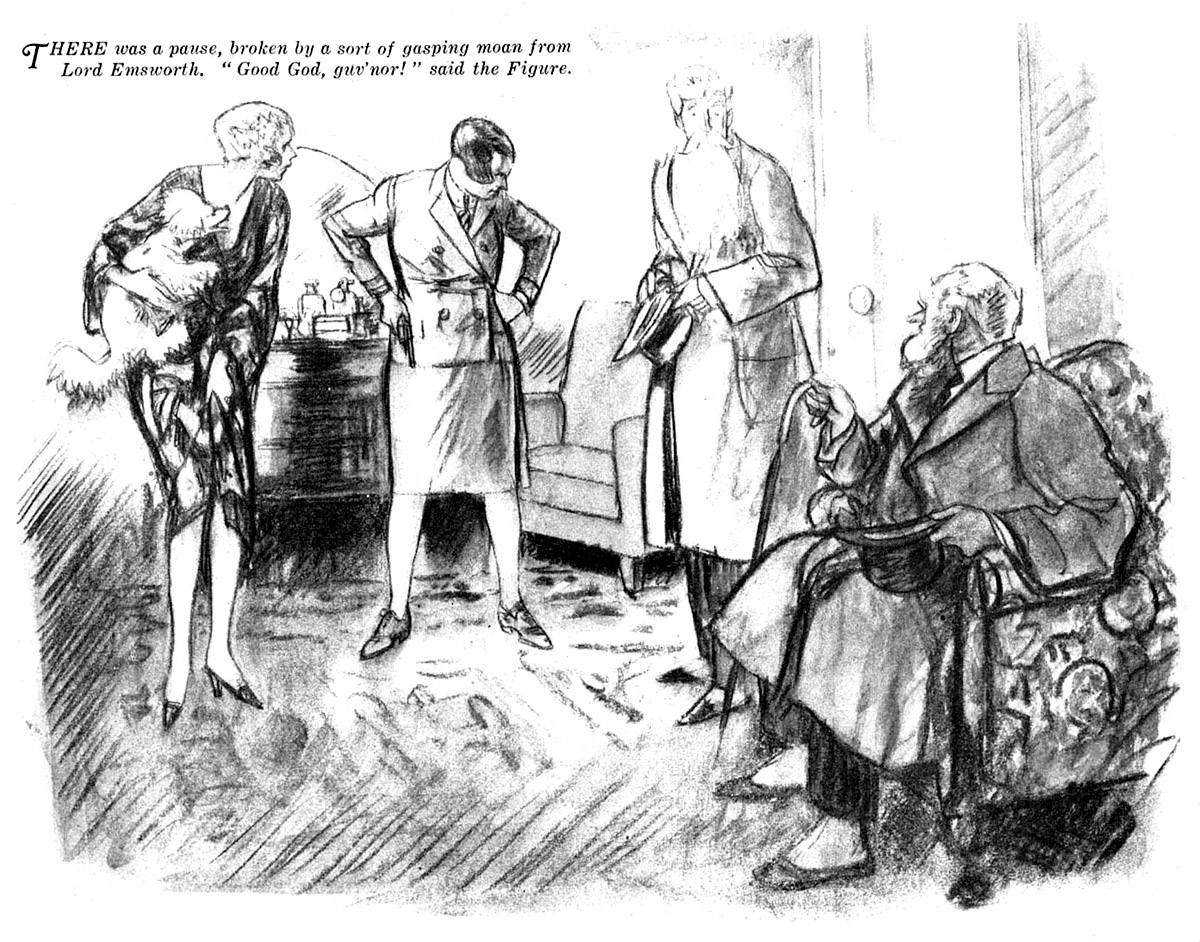
“Good God, guv’nor!” said the Figure, sighting him. His wife pointed at Lord Emsworth.
“Freddie, is that your father?”
“Oh, yes. Rather! Of course. Absolutely. But he said he wasn’t coming.”
“I changed my mind,” said Lord Emsworth in a low, stricken voice.
“I told you so, Jane,” said the girl. “I thought he was Lord Emsworth all the time. Surely you can see the likeness now.”
A kind of wail escaped his lordship.
“Do I look like that?” he said brokenly.
HE gazed at his son once more and shut his eyes.
“Well,” said Miss Yorke, in her detestable managing way, turning her forceful personality on the newcomer, “now that you are here, Freddie Threepwood, looking like Father Christmas, what’s the idea? Aggie told you never to come near her again.”
Love had apparently made Frederick Threepwood a man of steel. Removing his beard and eyebrows, he directed a withering glance at Miss Yorke.
“I don’t want to talk to you,” he said. “You’re a serpent in the bosom. I mean a snake in the grass.”
Freddie turned to his wife with a sweeping gesture.
“I—” He paused. “I say, Aggie, old thing, you look perfectly topping in that kimono.”
“Stick to the point,” said Miss Yorke.
“That is the point,” said Mrs. Freddie, not without a certain softness. “But if you think I look perfectly topping, why do you go running around with movie actresses with carroty hair?”
“Red-gold,” suggested Freddie deferentially.
“Carroty!”
“Carroty it is. You’re absolutely right. I never liked it all along.”
“Then why were you dining with it?”
“Yes, why?” inquired Miss Yorke.
“Be quiet, Jane. Well, Freddie?”
“Aggie,” said the Hon. Freddie, “it was this way.”
“NEVER believe a man who starts a story like that,” said Miss Yorke.
“Do please be quiet, Jane. Yes, Freddie?”
“I was trying to sell that carroty female a scenario, and I was keeping it from you because I wanted it to be a surprise.”
“Freddie darling! Was that really it?”
“You don’t mean to say—?” began Miss Yorke incredulously.
“Absolutely it. And, in order to keep in with the woman—whom I may as well tell you I disliked rather heartily from the start—I had to lush her up a trifle from time to time.”
“Of course.”
“You have to with those people.”
“Naturally.”
“Makes all the difference if you push a bit of food into them preparatory to talking business.”
“All the difference in the world.”
Miss Yorke, who seemed temporarily to have lost her breath, recovered it.
“You don’t mean to tell me,” she cried, turning in a kind of wild despair to the injured wife, “that you really believe this apple-sauce?”
“Of course she does,” said Freddie. “Don’t you, precious?”
“Of course I do, sweetie-pie.”
“And, what’s more,” said Freddie, “I can prove it. Here’s a cable that came this morning from the Super-Ultra-Art Film Company, offering me a thousand merry dollars for the scenario. So another time, you, will you kindly refrain from judging your—er—fellows by the beastly light of your own—ah—foul imagination?”
“Yes,” said his wife. “I must say, Jane, that you have made as much mischief as anyone ever did. I wish in future you would stop interfering in other people’s concerns.”
“Spoken,” said Freddie, “with vim and not a little terse good sense. And I may add——”
“If you ask me,” said Miss Yorke, “I think it’s a fake.”
“What’s a fake?”
“That cable.”
“What do you mean, a fake?” cried Freddie indignantly. “Read it for yourself.”
“It’s quite easy to get cables cabled you by cabling a friend in New York to cable them.”
“I don’t get that,” said Freddie, puzzled.
“I DO,” said his wife. And there shone in her eyes the light that shines only in the eyes of wives who, having swallowed their husband’s story, resent destructive criticism from outsiders. “And I never want to see you again, Jane Yorke.”
“Same here,” agreed Freddie. “In Turkey they’d have shoved a girl like that in a sack and dropped her in the Bosphorus.”
“I might as well go,” said Miss Yorke.
“And don’t come back,” said Freddie. “The door is behind you.”
The species of trance which had held Lord Emsworth in its grip during the preceding conversational exchanges was wearing off.
And now, perceiving dimly that Miss Yorke was apparently as unpopular with the rest of the company as with himself, he came gradually to life again.
His recovery was hastened by the slamming of the door and the spectacle of his son Frederick clasping in his arms a wife who, his lordship had never forgotten, was the daughter of probably the only millionaire in existence who had that delightful willingness to take Freddie off his hands; which was, in Lord Emsworth’s eyes, the noblest quality a millionaire could possess.
He sat up and blinked feebly. Though much better, he was still weak.
“What was your scenario about, sweetness?” asked Mrs. Freddie.
“I’ll tell you, angel-face. Or should we stir up the guv’nor? He seems a bit under the weather.”
Lord Emsworth had risen. He was tottering a little as he approached them.
“Oh, Lord Emsworth,” said Mrs. Freddie, “I’m so dreadfully sorry. I wouldn’t have had anything like this happen for the world.”
LORD Emsworth patted her hand paternally. Once more he was overcome with astonishment that his son Frederick should have been able to win the heart of a girl so beautiful, so sympathetic, so extraordinarily rich.
“The fault was entirely mine, my dear child. But—” He paused. Something was plainly troubling him. “Tell me, when Frederick was wearing that beard—when Frederick was—was—when he was wearing that beard, did he really look like me?”
“Oh, yes. Very like.”
“Thank you, my dear. That was all I wanted to know. I will leave you now. You will want to be alone. You must come down to Blandings, my dear child, at the very earliest opportunity.”
He walked thoughtfully from the room.
“Does this hotel,” he inquired of the man who took him down in the lift, “contain a barber’s shop?”
“Yes, sir.”
“I wonder if you would direct me to it?” said his lordship.
the end
Annotations to this story as collected in volume form are on this site in the notes to Blandings Castle and Elsewhere.
The longer version of the story from the Strand magazine is transcribed on this site as well. The Strand version has details of Freddie’s scenario and a closing scene at Blandings with Lord Emsworth and Beach.
 Madame Eulalie’s Rare Plums
Madame Eulalie’s Rare Plums